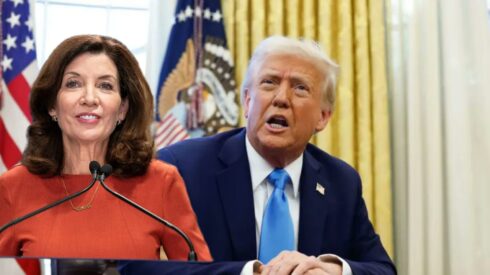The Trump administration has revoked federal approval for New York City’s congestion pricing program, a move that has triggered a legal battle between state and federal authorities. The controversial tolling system, designed to reduce traffic congestion and generate funds for the city’s transit system, had been in effect for just over a month before the administration’s intervention.
Trump Administration Strikes Down Congestion Toll
U.S. Transportation Secretary Sean Duffy announced the federal government’s decision to rescind approval for New York City’s congestion pricing program, arguing that it disproportionately burdens working-class Americans and small businesses. The program, which went into effect on January 5, 2025, required drivers to pay a $9 toll during peak hours to enter Manhattan below 60th Street, with even higher fees for trucks and buses.
Duffy criticized the toll as an unfair policy that forces working people to subsidize public transit rather than highway infrastructure. “Commuters using the highway system to enter New York City have already financed these roads through gas taxes and other fees,” he stated. “This toll program leaves drivers without any free alternative and unfairly takes more money from working people to fund a transit system that many of them do not use.”
President Donald Trump celebrated the decision on social media, posting, “CONGESTION PRICING IS DEAD! Manhattan, and all of New York, is SAVED. LONG LIVE THE KING!” The post included an edited image of Trump wearing a crown against the New York City skyline, further inflaming tensions between state and federal officials.
New York Officials Vow Legal Challenge
In response to the federal government’s decision, the Metropolitan Transportation Authority (MTA) immediately filed a lawsuit to prevent the Trump administration from terminating the program. MTA CEO Janno Lieber defended congestion pricing as an effective solution for Manhattan’s traffic and pollution challenges, citing a 9% decrease in congestion since its implementation.
Governor Kathy Hochul condemned the Trump administration’s move as an attack on New York’s sovereignty. “We are a nation of laws, not ruled by a king,” she declared in a fiery speech at a Manhattan subway station. Holding up the viral image of Trump in a crown, Hochul insisted, “New York hasn’t labored under a king in over 250 years, and we sure as hell won’t start now.”
Hochul reaffirmed that the tolls would continue despite the federal government’s opposition. She stressed the program’s benefits, noting its impact on reducing traffic accidents and encouraging greater use of public transportation.
Supporters and Opponents React
Reactions to the Trump administration’s decision have been deeply divided. Supporters, including many business leaders and suburban commuters, praised the move as a relief for drivers who frequently enter Manhattan for work. New Jersey Governor Phil Murphy, who had previously appealed to Trump to reconsider the program, welcomed the decision. “The current program lines the MTA’s pockets at the expense of New Jerseyans,” he said in a statement. “This toll unfairly burdens commuters who work in the city and does nothing to address the real issues with New York’s transit system.”
However, transit advocates and environmental groups sharply criticized the federal intervention, arguing that congestion pricing is essential for reducing emissions and improving mass transit. Advocacy group Riders Alliance issued a statement condemning the decision, stating, “This is a blatant political move that ignores the real benefits of congestion pricing. It’s about punishing New York for standing up to Trump, not about helping everyday commuters.”
Implications for Manhattan and the MTA
The legal battle over congestion pricing has raised concerns about the future of New York City’s public transit funding. The MTA had planned to use revenue from the tolls—estimated at $1 billion annually—to upgrade subway infrastructure, improve bus services, and expand accessibility for disabled riders. With federal approval revoked, the agency now faces uncertainty over how to fill this financial gap.
Transportation analysts warn that without congestion pricing, Manhattan could see a return of severe gridlock, longer travel times for emergency responders, and increased air pollution. “Congestion pricing was already showing results,” said urban planning expert Janette Sadik-Khan. “Traffic was down, and subway ridership was improving. This reversal could set us back years in our fight for a more sustainable and efficient city.”
As the legal dispute unfolds, New Yorkers remain divided on the issue. While some see the Trump administration’s move as a necessary correction to an unfair policy, others view it as an attack on local governance. For now, the fate of congestion pricing in New York City remains uncertain, with both sides gearing up for a high-stakes courtroom battle.














